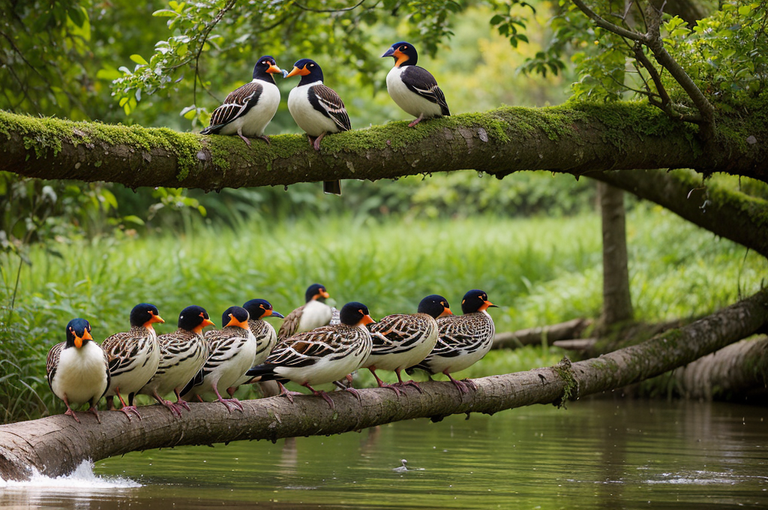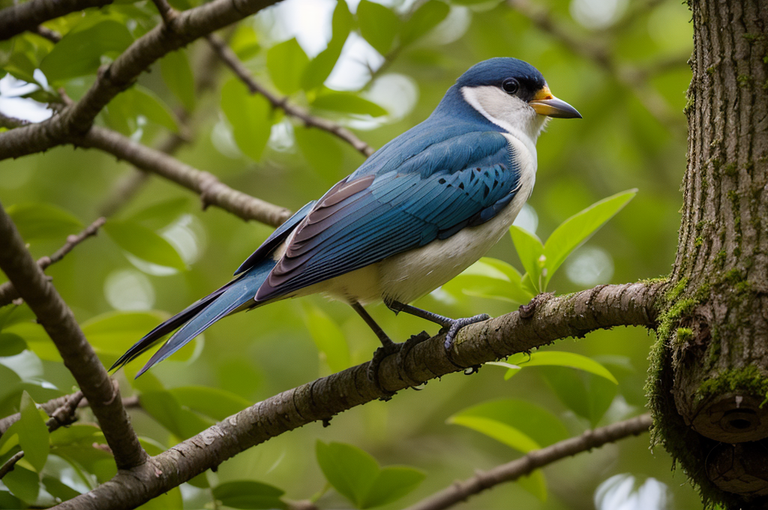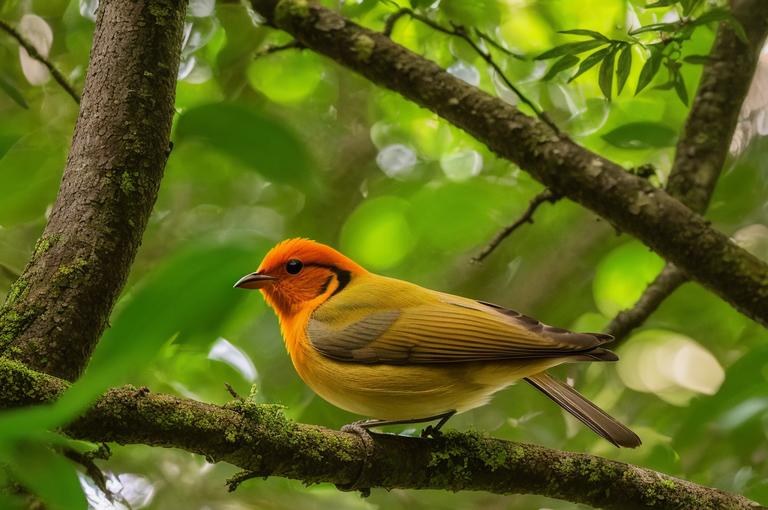Exploring the Diverse World of North American Birds: Species, Behavior, and Birdwatching Essentials

The article discusses different bird species in the U.S, their unique behaviors, feeding and nesting habits. It also covers diseases affecting birds, tools for birdwatching, and related resources.
Bird Species in the U.S
As the sun ascends above the horizon, the American wild awakens, filling the air with a chorus of wild birds name: American Goldfinch, Northern Mockingbird, American Robin, Black capped Chickadee, Blue Jay, and the Brown headed Cowbird. Each one, a native species creating a unique harmony that accents the dawn.
Native Species
These birds, such as the American Robin, bear the distinct honor of being endemic to our American wild. The American Goldfinch with its luminous yellow feathers stands as a bright contrast to the Blue Jay’s calming hues. Interlaced with the teasing melodies of the Northern Mockingbird, the playful banter of the Black capped Chickadee, and the bold proclamations of the Brown headed Cowbird, you encounter an avian orchestra.
Introduced Species
Not all the avian voices we hear belong to natives. Some are from foreign lands, like the cooing Eurasian Collared Dove or the assertive chitter of the European Starling. Though late additions to America’s bird composition, they’ve bravely carved their place into our wilderness, intertwining with the existing melodies in a unique harmonious niche.
Common Migratory and Resident Species
Together, both native and introduced, we witness approximately 650 various species fluttering between the United States and Canada’s airspaces. These include migratory voyagers seeking enriching summers and warmer winters, as well as all year residents who’ve chosen to weave their tales amongst our trees permanently.
Capturing these avian tales, forever etched onto the canvas of our wilderness produces an enriching experience. Each bird species, regardless of native, introduced, or migratory, contribute to our understanding of the variance, resilience, and adaptation characteristics of the avian world. Not only do these observations enhance our understanding of nature but also weave poignant reminders of the delicate balance of life itself.

Characteristics of Different Bird Species
As an ornithologist and adventurer, my journeys have largely revolved around studying the fascinating behaviors of wild birds; their names etched in my heart forever. Witnessing their cascading flights and listening to their soothing sonnets has always been a surreal experience unlike any other.
Unique Behaviors
The world of birds is awash with captivating behaviors. Take the Northern Mockingbird for instance; it can mesmerizingly learn and mimic close to 200 songs, a unique adaptation to attract a mate. Then there’s our friend, the Blue Jay. It has an uncanny ability to mimic the calls of other birds truly, an opera singer of nature’s grand theater. 🎭
Seasonal Patterns
While observing birds, have you ever noticed a change in their color? This phenomenon, known as molting, is particularly significant in species such as the American Goldfinch. During spring and summer, the males display a vibrant yellow plumage, while in fall and winter, they transition to a duller, olive brown hue. It’s akin to them changing coats with the seasons. 🍂🍃
Nesting Patterns and Egg-related Details
If you dig deeper into the bird world, you will uncover their intricate nesting patterns and the mesmerizing egg related details. The color, size, and number of eggs vary across species. The incubation and fledging periods are yet another testament to the diverse survival strategies adopted by avian creatures. I am often astonished by the meticulous craftwork of a bird’s nest and the protective instinct they possess towards their eggs and chicks, sweet melodies filling the air as they tuck their young in for the night. 🐤
Finally, if a bird watcher’s goal is to simply appreciate avian beauty, knowing the different wild birds names and their phenomenal idiosyncrasies will certainly deepen their connection with these marvels of nature. This, more than anything, augments my passion and thirst for exploring the avian world and sharing their stories with you.

Bird Diets and Feeding Habits
The world of birds is abundant with varying diets and feeding habits, each adapted to the unique biology and environment of various species. Among the many types of wild birds, each one has its specific preferences and needs.
Types of Seeds Birds Prefer
Seed selection varies by bird species, each with a distinct palette tuned to a select assortment of seeds. Blue Jays, for instance, are quite fond of sunflower seeds and peanuts. Similarly, Mourning Doves display a preference for millet seeds, while smaller finches are ardent fans of thistle (Nyjer) seeds.
Fruit and Berry Consumption
Feathered friends, such as the American Robin, revel in the sweet allure of fruits and berries. They scour the land, often in noisy and boisterous flocks, for succulent morsels, indulging in an assorted mix of berries, cherries, and even the occasional apple.
Exceptional Cases: The Hummingbird’s flapping speed related to energy needs
In the realm of the extraordinary, hummingbirds leave most avian creatures in the dust with their high metabolic turnover. A flapping speed of up to 80 times per second fuels their energy needs, making the hummingbird a kind of avian superhero. A diet rich in nectar and small insects sustains this fever pitched energy demand, reflecting the boundless marvels of bird kind.
The diversity and complexity of bird diets broaden our understanding of these fascinating creatures. Uncovering these threads illuminates the magnificent tapestry of life hidden within our own backyards and forests. As I continue to explore this avian world, I take a moment to marvel at the distinctive diets and feeding habits that are as varied and brilliant as the birds themselves.

Bird Health and Disease Concerns
In the pursuit of understanding our avian co inhabitants, it’s crucial to delve into the threats they face, notably the health challenges and diseases that limit the survival of certain wild bird species.
Impact of West Nile Virus on Certain Bird Species
West Nile Virus (WNV) is one such menace. It has dramatically influenced the populations of the Common Grackle and the American Crow, deteriorating the health landscape for these wild bird species. Although the virus is seen to affect humans and mammals, its impact on these avian populations cannot be underestimated. It’s as if each bird affected by WNV is having its wings clipped – not by the ruthless snip of human intervention, but rather, the silent and stealthy touch of a deadly pathogen, invisible and yet all consuming.
Parasitic Nesting Habits and their Implications
In the twists and turns of bird behaviours, you’ll come across the Brown headed Cowbirds’ unique parasitic nesting habits. Renowned for their uncanny method of survival, these birds lay their eggs in the nests of other bird species, essentially outsourcing the responsibility of raising their young. This survivalist tactic, although fascinating to observe, brings forth a plethora of implications for the host birds, often threatening the survival of their own young ones.
The beauty of bird watching and studying various avian species isn’t merely the joy of basking in their wonder. Rather, it’s about understanding the challenges they face – just as the violet dusk reveals the stars. It forms the basis of our collective fight towards preserving and protecting these incredible species. The whispering winds and warbling calls of our avian friends are a call to action—a reminder to care for the world that sustains us and them in harmony.
Resources and Tools for Birdwatching
Every devoted bird watcher has their toolkit, each tool bridging the gap between us land bound humans and the wonderful wild bird species.
Necessary Birdwatching Accessories
My personal assortment includes a collection of birdwatching accessories that make the experience more delightful. Even the simplest bird feeders and waterers play a major role in inviting our feathered friends, gracing our gardens with a flurry of wings and a symphony of the wild birds names. Each accessory I use, each bird product gracing my shelves, holds a special bond with the winged world, beckoning to the whispering skies, the songs of the wild birds name.
Resources for Identifying Different Bird Species
From vibrant Hummingbirds to the charming Orioles, my interest expands over various types of wild birds. Over the years, I have gathered extensive resources to identify different bird species. These resources are the treasure troves helping paint the images of these fine creatures, even helping identify a new face in the crowd bobbing their heads at the feeder.
Importance of JavaScript for Optimal Viewing of Bird-related Information
And let’s not forget, our digital era tools need respect as well. JavaScript enabled in your browser is essential for experiencing online bird related websites at their finest. In a world where wing beats coexist with keystrokes, let’s make sure we are fluently speaking both the languages of the wild and the web.
Birdwatching, like art, is more than a mere hobby. It is a lifestyle etched in the early morning fog, warmed by the dawn’s first light, and personified in the rustling of the leaves as a graceful silhouette takes flight. We see, we listen, we learn – and with the right resources and tools, we grow closer to the magic of our feathered friends.


